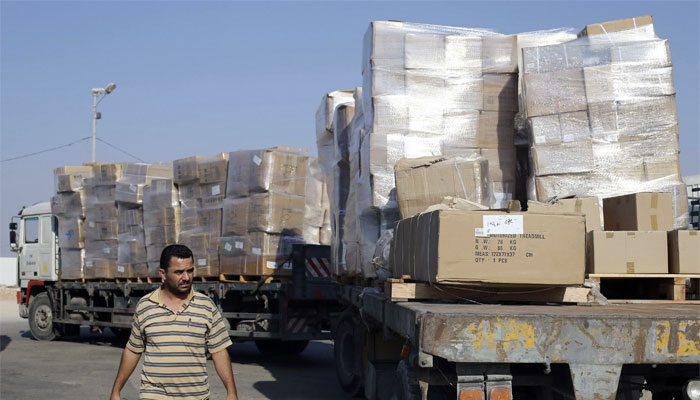A Palestinian man walks next to a truck loaded with goods after entering Gaza at the Kerem Shalom crossing, in Rafah in the southern Gaza Strip Reuters
AFP/Gaza City
Lorries heaped with goods bound for Gaza shops heaved into the war-torn enclave on Thursday, but there was no sign of the much-needed building materials to start the all-important reconstruction.
An increasing number of trucks, carrying everything from biscuits and soft drinks to nappies, could be seen passing into Gaza through the Kerem Shalom crossing, after a Tuesday ceasefire ended 50 days of bloody and destructive fighting.
Drivers clambered over huge stacks of sweets and canned food mounted on the back of their lorries, shouting to one another and at customs inspectors in the dusty yard of the crossing, as a handful of black-clad policemen wandered through the parked trucks.
Talib Abu Jaray, a 50-year-old driver, stood waiting for his cargo of vegetables to be cleared by customs inspectors, who were poring over a truckload of food aid from the Red Cross parked nearby.
He said the situation at the crossing had become "a little easier" since the ceasefire, and that some items restricted by the Israelis had been allowed in again.
"But as for the things that the people of the Gaza Strip were waiting for, regarding construction materials, nothing has got through," Jaray said, angrily.
"There's a ceasefire but it's not enough. We want to build a state, a homeland, a new generation."
During the fighting, the crossing was open for humanitarian aid and fuel but on Thursday, Israel began allowing commercial goods through for the first time since the conflict started on July 8, bringing in much-needed goods for shops across the strip.
Under the terms of the truce, Israel has agreed to ease the restrictions to allow materials for the construction of the battered enclave. But it was unclear exactly what would be allowed in.
The crossing's director, Munir al-Ghalban, said he was expecting more trucks carrying stocks to line the shelves of Gaza's shops, but there was no sign of the material needed for reconstruction.
"Today about 300 lorries are expected to arrive, during the days of the war, around 200 lorries used to cross," he said.

